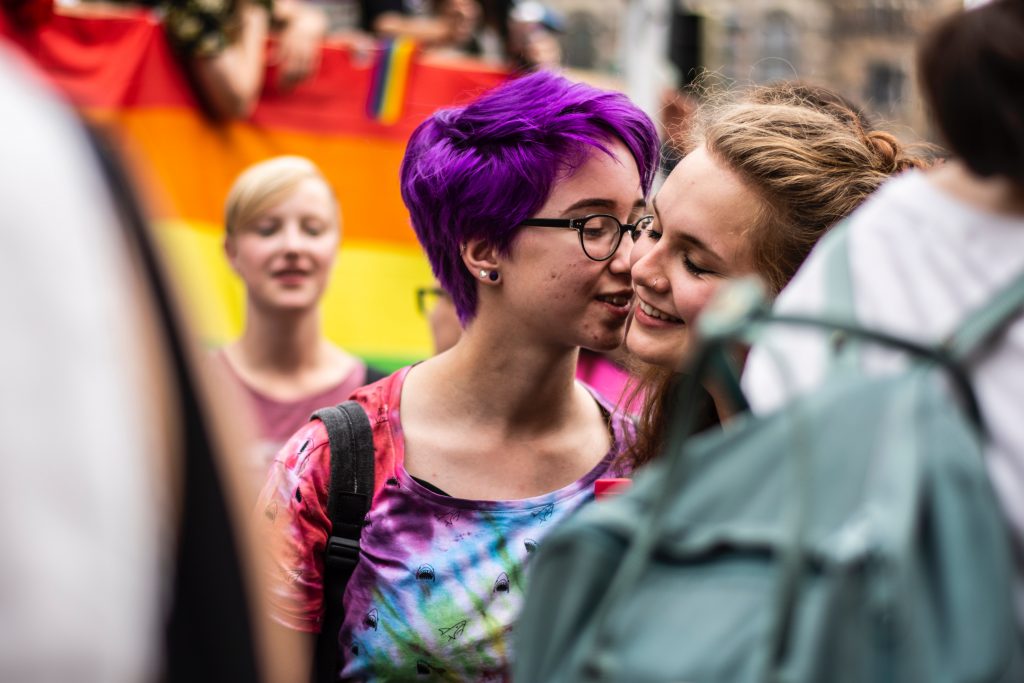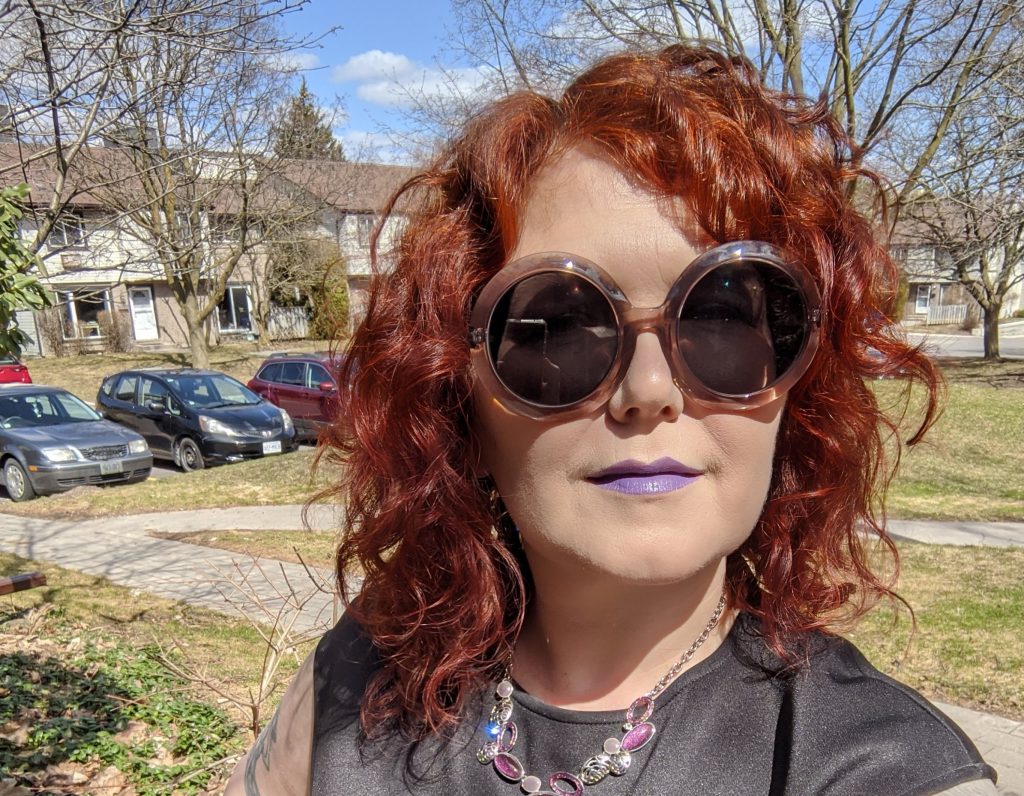You are visiting Liisbeth’s archives!
Peruse this site for a history of profiles and insightful analysis on feminist entrepreneurship.
And, be sure to sign up for rabble.ca’s newsletter where Liisbeth shares the latest news in feminist spaces.

Fourteen years ago, I got a job as a matchmaker at a high-end dating agency in downtown Toronto. It was awful. Once I learned how the company operated, my dreams of putting perfect matches together were shattered. Our members had paid ridiculous amounts of money to join our closed network; they could only be matched with other people who had also paid to join. And as far as I could tell, most of these members wanted nothing to do with each other. Salespeople charged outrageous and whimsically fluctuating prices, and the company embraced dishonesty as a policy. No wonder our clients were always angry.
As a “dating consultant” in the Matching department, my job was to try and convince these disillusioned people to say “yes” to each other. I heard “no” a lot and spent far too much time making notes on people’s disappointment with our company, and more hauntingly, their loneliness. It was frustrating being unable to help my clients, and I was disgusted by the sexist sales structure. Women routinely paid three times as much as male clients—often well over $10,000 for four to six “introductions,” which our company (and most traditional matchmakers) defined as the exchange of contact details. I learned that this is the norm for “traditional” matchmaking and dating agencies.
Still, I enjoyed putting people together—especially the clients who hadn’t heard from us in years—and I managed to make some good matches in that wasteland. I also learned some valuable things about human nature: People really cling to stereotypes when it comes to dating, even if they seem enlightened about everything else; most people would rather hear the truth than a comforting lie; plus, everyone—and I mean everyone—self-identifies as youthful, with a good sense of humour.
But most of the time, I was ashamed of the way the company forced me to lie and stall people. I quickly tired of fielding justifiably angry phone calls. I actually began advising my favourite members that they would be better off spending their time and energy on a dating site.
That company folded—a victim of the 2008 economic crisis—while I was on maternity leave. I hadn’t imagined that I would ever go back there, but I was surprised and disappointed that I never had the chance to say goodbye to my members. Fortunately, a handful of them had given me their email addresses. In 2012, when I launched my own business, Junia Matchmaking Services, they became some of my very first clients.

I operate almost exclusively online, using existing dating sites. I consider myself a matchmaker, but also a dating coach and online dating surrogate/concierge. Essentially, I am e-Cyrano. I’m often better at writing about you than you would be yourself. I write dating profiles. I also curate and edit my clients’ pictures. Sometimes I even take the photos myself. I then set clients up on dating websites like POF (formerly PlentyOfFish) and Match, where I run their profile(s) entirely. I’m the online version of them.
I get the irony in what one of my clients said about my service: “You don’t realize you aren’t being yourself until you are finally allowed to be.” Bonnie, 55, is living with the man I found for her on POF a little less than a year ago. “I was looking in all the wrong places,” she laughs, admitting that she was stuck on “eye candy.”
My services are particularly valuable to women, although I serve clients of all genders, including non-binary people. Most people outside of my industry aren’t aware that men consistently outnumber women on dating sites and apps. This gap persists because so many women are hesitant to “put themselves out there.” Many women hire me because they’ve heard of or had a “gross” experience online. I’ve been using dating sites professionally for eight years, and I know a lot about the privacy settings, which keeps intrusive messages to a minimum. I immediately delete offensive or sexual remarks and block users who display any impatience. I’m always amazed by how many people think 24 hours is too long to wait for a response to a question about the last book you read.
I also pay very little attention to the unsolicited messages my clients receive; rather, I spend my time searching the websites for prospects who meet my client’s criteria, running those candidates by my clients, and then sending friendly messages to any matches a client approves—signed with my client’s name. If the conversation goes well, and the client is willing to meet the person I’ve been talking to, I will set them up on a first date.
My clients don’t wait to hear from the people they might want to meet, because I am starting that conversation for them.
My mission is to make my services accessible and affordable to anyone who wants to use them. I have virtually no overhead, working from an office in the basement of my Guelph, Ont., home. Many—but not all—of my clients would have difficulty finding representation with a traditional matchmaker, including singles disadvantaged by intersecting forms of oppression. I often work on behalf of older women, LGBTQ+ people, people with disabilities, and people of colour. My regular clients pay a monthly fee of $475 (including HST), but I offer services on a sliding scale for seniors, students, artists, and anyone else on a limited income or facing financial hardship. I never turn away anyone I think I can help.
I work with clients month by month until we’ve found someone they want to keep seeing—or until they’ve gained the confidence to work their profile for themselves. I don’t always get to hear the follow-up story. My definition of “success” is pretty fluid. Marriage isn’t always the goal. People come to me for different reasons. Some haven’t dated in 40 years and they just want to learn the “ropes.” Some want to find a lifetime love but never live together. Some just want to have sex again, with or without love.
They also come to me at all stages of life; my youngest client was 24, and my oldest was 77. That client, Georgina, is getting married to a 73-year-old in June. A lot of former clients keep in touch. I get invited to at least one or two weddings a year—the ones where one spouse has told the other of my role. I can also take credit for about a dozen babies so far.
Right now, things have definitely slowed down as a result of the COVID-19 crisis. Almost all of my clients have chosen to put things on hold for the moment. It’s hard for people to imagine paying hundreds of dollars to “meet” someone they might not actually meet face to face for a year. But it’s also an excellent time to be online dating, for that exact reason. You can be as picky as you like right now! And, well, the only safe way to search for love now is online.
But nudging matchmaking into 21st century reality isn’t only about being online. While the industry remains heavily burdened by patriarchal convention, there is a growing number of matchmakers willing to stand up and be counted as feminist. Many are members of a large Facebook group, “Professional Love Connectors”. Tammy Shaklee, an Austin, Texas–based matchmaker who runs the company, H4M, is a “straight ally” who exclusively serves the LGBTQ+ community, providing one-to-one introductions for clients all over the United States. She’s also committed to making social justice a pillar of her work, and H4M donates thousands to LGBTQ+ charities every year, while encouraging its mainly affluent clientele to do the same.
Another group member, Amy Van Doran, says “feminist” is the word that started her career. She is the founder of New York City’s Modern Love Club, and defines a feminist matchmaker as one who “enables women to have as much agency in the dating process as their male counterparts.” She runs her “hyper-curated” old-fashioned matchmaking business out of an East Village gallery space in Lower Manhattan. She fills her company’s Rolodex by interviewing 54 people a week during “office hours,” and hosting regular art openings and events in the evening that draw an eclectic mix of artists, professionals, and other NYC singles. There’s a dedicated “free dating spot” right outside the storefront in warm weather months, for visitors who want to get to know each other on the premises. From that potential pool, she agrees to arrange matches for only “16 remarkable clients a year.”
Fees are hefty, starting in the $20,000 range, and Van Doran only takes on those she really feels she can help—and who can obviously pay. But that doesn’t mean the standard cis-het, white professionals only—she’s more interested in what’s going on inside a person’s head. Van Doran prefers to match “really interesting people, with a lot going on intellectually.” In her experience, the more unique, original, and engaging a person is, the harder it is for them to find love in the wild. That’s where she comes in; not just putting two people together, but convincing them to take a leap of faith or see potential in someone they are inclined to dismiss.
She cites the recent match of her yoga instructor in New York City with a man she met at Burning Man who lived on a commune in Oregon. “I was like, ‘Listen. Hear me out. This guy is your guy.’ It was so weird, but it was just obvious.” Her client listened. He left the commune. They now live in upstate New York, and they’re getting married.
Van Doran says she helps her clients free themselves from “thinking that you have to date a certain kind of person.” She believes criteria such as matching incomes, racial preferences, and even height parameters are obstructing the most important part of the matchmaking process. “We need to get away from all that and just ask, ‘Does this person make me happy?’ Everything else is going to change.”
One challenge of matching extraordinary people—and women in particular—is that they often expect a partner to bring exactly what they offer to a match, in terms of ambition, education, or material success. Van Doran challenges her clients to stop thinking that they have to date someone with a very similar lifestyle and career. “You don’t need two people who are running at top speed all the time.”
In my own matchmaking work, I have discovered that while complementary lifestyles can be extremely important, opposites who don’t tick all of each other’s boxes often make good matches. Van Doran and I both agree that the most important thing in finding a good match is paying attention to how a person makes you feel. Do you feel heard when you are talking to them? Do they make you laugh? Do you smile when you think of them? Are you excited to see their name come up on the phone? Would your best friend, your grandma, or your dog get along with them? Now that’s a match!
If you enjoyed this article and appreciate LiisBeth, the world’s first feminist magazine dedicated to supporting feminist entrepreneurs, please consider supporting us so we can do more. We are a reader supported indie magazine. Every bit helps! [direct-stripe value=”ds1554685140411″]
Related Readings
https://www.liisbeth.com/2016/04/19/bridge-over-tricky-waters-love-business-and-good-governance/
https://www.liisbeth.com/2020/01/22/dont-mock-these-cocktails/
You are visiting Liisbeth’s archives!
Peruse this site for a history of profiles and insightful analysis on feminist entrepreneurship.
And, be sure to sign up for rabble.ca’s newsletter where Liisbeth shares the latest news in feminist spaces.





